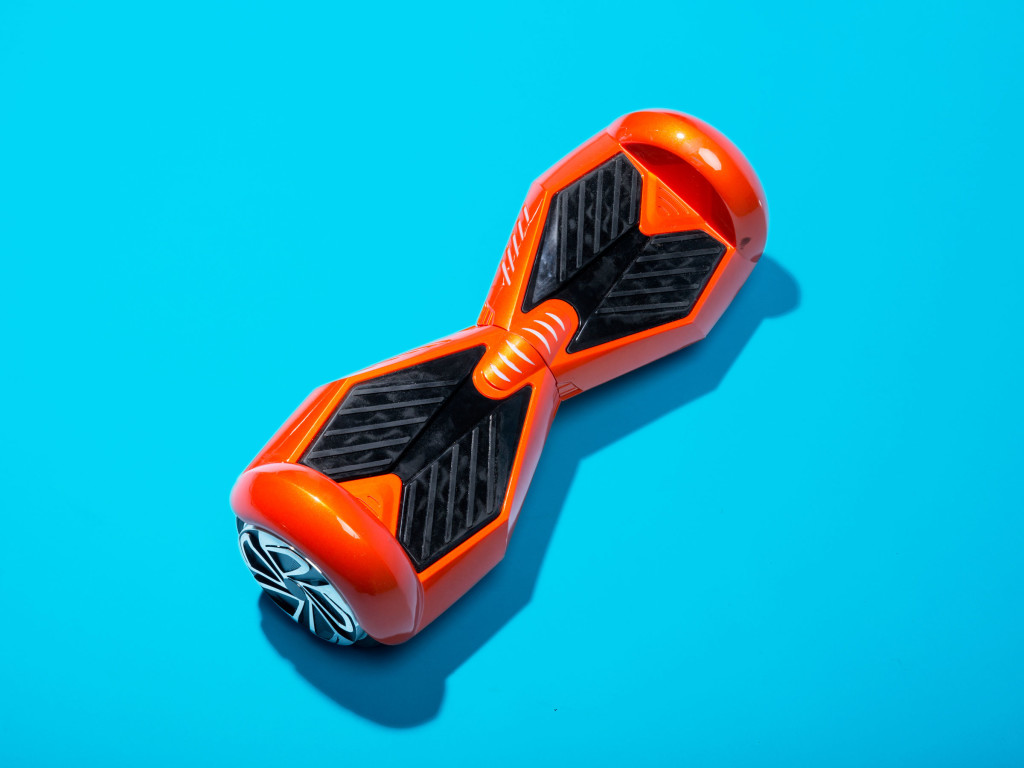
MAYBE YOU’VE BEEN holding off buying a hoverboard because you’re afraid it’ll catch fire and burn down your house. Smart you! But thanks to a new certification process, it should be easy to find one that’s far less likely to explode.
UL, the firm that conducts OSHA-approved safety testing on consumer products (they’re the people who make sure yourcircuit cables don’t explode and are responsible for the perfection that is your metal waste can), is trying to smooth out all the hoverboard-related hiccups by introducing guidelines for hoverboards. The folks at UL have begun accepting product submittals for “self-balancing scooters.” The UL will evaluate the construction of the devices and, if they pass the company’s tests, certify them as safe under a new certification called UL 2722. UL 2722, also known as “Electrical Systems for Self-Balancing Scooters,” will cover electric drive trains, “including the rechargeable battery and charger system combination for use in self-balancing scooters.”
Submitting a hoverboard for approval is simple: UL has a form where you can request to be part of the certification process. (Hilariously, and appropriately, UL has even dedicated a new landing page to hoverboards.)
“With UL 2722, our expert science, research, and engineering teams have now developed the appropriate requirements and methodology to confidently evaluate and test the entire self-balancing scooter for electrical and fire hazard safety as a system,” says UL VP and general manager for UL’s Energy and Power Technologies, Jeff Smidt.
The testing process will focus on the battery—overcharge (to make sure the battery can’t go beyond its rated voltage and capacity) temperature (to make sure it doesn’t overheat), and drop tests (to make sure they can withstand strikes) will be conducted. UL says other tests will include: “a short-circuit, over-discharge, imbalanced charging, dieleltric voltage, vibration, shock, crush, [and] mold stress relief tests.”
It’s a small, necessary step forward for market that has gone largely unregulated for the past year. Home fires and personal injuries have largely been blamed on faulty, cheap batteries. Low-cost Li-ion batteries, many of them from China, are being thrown into boards—and from the outside, they all look identical; just shiny, hard plastic that helps you float (er, roll) around like a badass angel.
Recently, after a spate of fires, regulators and hoverboard-makers took a few jabs at one another over safety standards. The Consumer Product Safety Commission said it was going to investigate how the boards are made, and manufacturers tried to argue that they were using certified products to make the things—though that proved to not be the case. One specific point of contention was between hoverboard-makerSwagway and UL. Swagway said it had been using UL-certified batteries in its boards, and UL clarified that the use of certified batteries didn’t count as total UL certification.
Of course, the fact that lines have been very, very blurred on how safe or unsafe certain boards are is why dedicated certifications need to exist. And now, we have at least one. “This is an unusual situation, in that the requests for testing and certification are coming after a product has been mass produced,” says UL Consumer Safety Director John Drengenberg. “Most manufacturers and retailers seek and want safety certification in the early stages of when a product is introduced to the market.” Drengenberg says the UL certification also means that it will follow-up to make sure the standards are met in going forward, should manufacturers decide to change the creation process or materials used.
You have to wonder, though: By the time this certification process can really get rolling, are we going to be over hoverboards entirely? Forget the fact that you can’t even get them into certain countries, but their popularity has at least slightly waned in the face of headlines pronouncing them dangerous fire-wielders. But hey, maybe this means we’ll have a safety certification process in place by the timereal hoverboards are here.
via: wired






